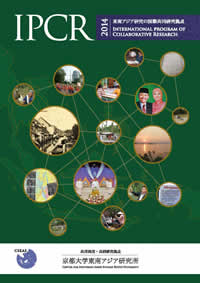| *: At time of Acceptancetd | |||
| Continue: FY2013(H25) / New: FY2014(H26) | |||
| Type I : Field-based Area Studies by Using Field Stations and Liaison Offices | |||
|---|---|---|---|
| H25 | I-1 | International Migration to Thailand from its Neighboring Countries: What Impact Will Economic Integration Make? | Yagura Kenjiro (Hannan University, Faculty of Economics) |
| H25 | I-2 | Chinese Commercial Network from 1930’s to 1950’s Batavia-Jakarta | Izumikawa Hiroshi (Hiroshima Jogakuin University, Faculty of Liberal Arts) |
| H26 | I-3 | International Collaborative Research of Mekong Giant Catfish Conservation | Mitsunaga Yasushi (Kinki University, Faculty of Agriculture) |
| H26 | I-4 | Anthropological Study of Network Construction of Hainanese Chinese in Indonesia | Yokota Sachiko (University of Shiga Prefecture, School of Human Cultures) |
| Type II : Intensive and Strategic Area Studies in Collaboration with CSEAS Visiting Fellows | |||
| H25 | II-1 | Comparative Study of Validity of Local Tourism for Supporting Disadvantaged Populations | Ishii Kayoko (Toyoeiwa University, Faculty of Political Science) |
| H26 | II-2 | Comparative Study of Traditional Application of Resources of SATO in Rural Development in Myanmar and Japan | Suzuki Reiji (Kyoto Gakuen University, Faculty of Bioenvironmental Science) |
| Type III : Document-sharing through Use of the CSEAS Repository | |||
| H25 | III-1 | Preparation of the Environment for Preservation and Utilization of Serial Publication Materials on Northern Vietnam during the Indo-China War | Iwatsuki Junichi (The University of Tokyo, Graduate School of Arts and Sciences) |
| H25 | III-2 | New Perspectives on Colonial Office Records: Searching for the States of “Singapore and Malaysia” in the Colonial Era | Kawano Motoko (National Graduate Institute for Policy Studies, Graduate School of Policy Studies) |
| H26 | III-3 | Landscape Changes in Mainland Southeast Asia through 3D-Image Map Archiving of William-Hunt Collection | Hasegawa Hiroyuki (Japan Federation of Land and House Investigators’ Associations) |
| Type IV : Exploratory Area Studies Aiming at Larger-scale Research Projects | |||
| H25 | IV-1 | Further Development of the Humanosphere Potentiality Index (HPI) | Sato Shiro (Osaka International University, Faculty of International Communication) |
| H25 | IV-2 | Role of the Judiciary in Democratization: Comparison of Thailand and Indonesia | Toyama Ayako (Kyoto University, Center for Southeast Asian Studies) |
| H25 | IV-3 | Long-term Acquisition and Practical Use of Resources on Southeast Asia | Yano Masataka (The University of Tokyo, Graduate School of Economics) |
| H25 | IV-4 | Transition and Resilience of the ‘War Affected Societies’ in Inland Southeast Asia | Seto Hiroyuki (Nagoya University, Graduate School of Law) |
| H25 | IV-5 | Thai Cultural History in the 21st Century: A Preliminary Study | Hinata Shinsuke (Shizuoka University, Organization for the Promotion of Global Education Programs) |
| H25 | IV-6 | Meta Study of Inter-disciplinarity in Natural and Social Sciences: Experiences from the Sustainable Humanosphere Project | Ubukata Fumikazu (Okayama University, Grad. Sch. of Environmental and Life Science) |
| H25 | IV-7 | Comparative Study of Social-Ecological Resilience in Southeast Asia | Naito Daisuke (Center for International Research Institute) |
| H25 | IV-8 | Ecological Transition in Neurodegenerative Diseases in Papua in Indonesia | Okumiya Kiyohito (Kyoto University, Center for Southeast Asian Studies) |
| H26 | IV-9 | Clientelist Politics and Developmental Politics in Southeast Asian Capital Cities | Kusaka Wataru (Nagoya University, Graduate School of International Development) |
| H26 | IV-10 | Southeast Asia in the History of the 19th Century Asian Economy | Ota Atsushi (Hiroshima University, Graduate School of Letters) |
| H26 | IV-11 | Re-publicizing the Philippines: Rebuilding lives after Typhoon Yolanda | Yamamoto Hiroyuki (Kyoto University, Center for Integrated Area Studies) |
| H26 | IV-12 | The Impact of Air Pollution Originating from Indonesion Peat Fires | Okumura Motonori (Kyoto University, Graduate School of Agriculture Science) |
| H26 | IV-13 | Memories and Discourse in Search of Justice—An Analysis of the Conflict over Acts of the Japanese Military during WW II in Asia | Matsuno Akihisa (Osaka University, Osaka School of International Public Policy) |
| H26 | IV-14 | Rural Myanmar in the Transition to Democracy | Matsuda Masahiko (Ritsumeikan University, College of International Relations) |
| H26 | IV-15 | Exploring the Urbanography of Yangon, Bangkok and Colombo as Integrated and Comparative Area Studies | Osada Noriyuki (Institute of Developing Economies, Current Affairs Studies Group, Area Studies Center) |
| H26 | Hayashida Hideki (Doshisha University, Institute for the Study of Humanities & Social Sciences) |
||
| Type V : Publication of “Kyoto Area Studies on Asia” | |||
| H26 | V-1 | Indonesian Women and Local Politics: Islam, Gender, and Networks in Post-Suharto Indonesia | Kurniawati Hastuti Dewi (Research Center for Politics, the Indonesian Institute of Sciences) |
| Type Ⅵ : Individual Research Program for Fostering Young Scholar | |||
| H26 | VI-1 | Constructing Gender Policy in Socialist Vietnam and Process of the Practice | Ito Miho (The University of Tokyo, East Asia Liberal Arts Initiative) |
| H26 | VI-2 | Examination of the Historical Geography of the Agricultural Development in the Central and Northern Vietnam | Ueda Shinya (Osaka University, Graduate School of Letters) |
| H26 | VI-3 | Care Ethics in Java, Indonesia: An Ethnographic Research | Gochi Sachiko (Tokyo University of Foreign Studies, The Graduate School of Global Studies) |
| H26 | VI-4 | Rethinking “Traditional” Swidden in Mainland Southeast Asia from a Historical Viewpoint | Hirota Isao (Nagoya University, Graduate School of Bioagricultural Sciences) |
| H26 | VI-5 | The Context of Basic Education Reconstruction in Cambodia after the Pol Pot Regime—Social Background and Position of Teachers and Schooling | Senda Sayaka (Nagoya University, Graduate School of Education and Human Development) |


You must be logged in to post a comment.